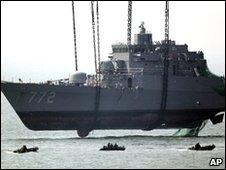US to conduct naval exercises with S Korea after attack
- Published

South Korea's president has vowed to punish those who carried out the attack
The US has confirmed it will hold naval exercises with South Korea, after a report blamed the North for the sinking of a Southern warship, officials say.
The Pentagon said the joint anti-submarine and other military exercises would start "in the near future".
South Korean President Lee Myung-bak earlier froze trade with Pyongyang, vowing to punish those who carried out the attack.
North Korea has said it will retaliate for any action taken against it.
The country's main newspaper called the investigation an "intolerable, grave provocation".
'Unequivocal support'
South Korea has said it will refer the North to the UN Security Council in response to the sinking of the Cheonan - and the resulting death of 46 sailors - in March.
In a move endorsed by the US, President Lee said in a televised address that Seoul would no longer tolerate "any provocative act by the North and will maintain a principle of proactive deterrence".
Pentagon spokesman Bryan Whitman said the decision to start joint naval exercises was "a result of the findings of this recent incident".
Analysts describe the joint exercises as a statement of US commitment to help Seoul rather than an attempt to intimidate Pyongyang.
US Secretary of State Hillary Clinton said earlier that her country was working hard to avoid an escalation.
After talks in China, she urged countries in the region to contain "the highly precarious situation created by North Korea".
China - North Korea's closest trading partner and a permanent member of the Security Council - has urged "restraint".
Japan said it was contemplating its own sanctions on Pyongyang.
The North depends on South Korea and China for up to 80% of its trade and 35% of its GDP.
In 2009, inter-Korean trade stood at $1.68bn (£1.11bn) - 13% of the North's GDP.
The measures announced by South Korea included:
Stopping inter-Korean trade
Banning North Korean ships from using South Korean waterways or shortcuts
Resuming "psychological warfare"
Referring the case to the UN Security Council
The BBC's John Sudworth in Seoul says the measures are as tough a response as the South could take short of military action.
The measures came less than a week after experts from the US, the UK, Australia and Sweden said in a report that a torpedo had hit the Cheonan.
They reported that parts of the torpedo retrieved from the sea floor had lettering that matched a North Korean design.
Pyongyang denies any involvement in the sinking, calling the investigation a "fabrication" and threatening war if sanctions were imposed.
"If [South Korea] sets up new tools for psychological warfare such as loudspeakers and leaves slogans for psychological warfare intact, ignoring our demands, we will directly aim and open fire to destroy them," a statement by the military said on Monday.
"More powerful physical strikes will be taken to eradicate the root of provocation if [South Korea] challenges to our fair response," said a commander, according to official news agency KCNA.